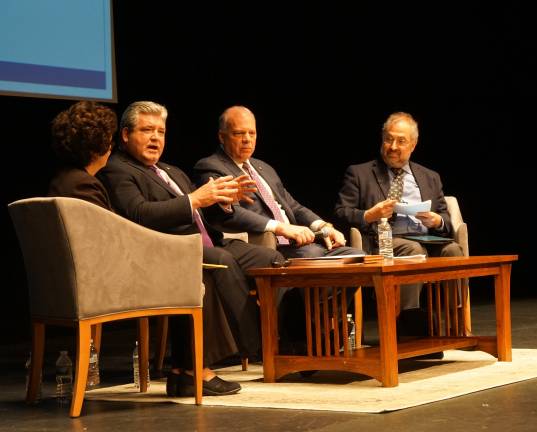Senators discuss Path to Progress

New Jersey Senate President Steve Sweeney (D) and State Sen. Steve Oroho (R) held a N.J. Path to Progress Town Hall meeting April 30 at the Sussex County Community College Performing Arts Center.
The two senators and Path to Progress Economic and Fiscal Policy members Marc Pfeiffer and Former N.J. Department of Education Commissioner Lucille Davy reviewed their recommendations to over 200 people in the audience.
Sweeney said the work-group had been charged with looking at the state of New Jersey's problems and how to fix them. Currently, he said the state has a $4 billion dollar deficit facing them in 2023, and the state teachers’ and workers’ pension system is in great danger of going bankrupt.
Some recommendations they reviewed included changing the health-care plans from Platinum to Gold level in order to save money.
People in the crowd cried out, “You didn’t put anyone at the table who had a vested interest.”
Oroho explained, the Affordable Care Act’s Cadillac Tax will cost over $600 million, as of 2022, based on taxing 40 percent of the 17 percent difference between New Jersey's actuarial insurance value of Platinum, 97 percent, and Gold value, 80 percent.
With just the pension alone, Oroho said, it is a $115 billion problem. In Trenton everyone wants to give promises and no payments, he continued. New Jersey has to fix this, Oroho said, with time and discipline.
During a question answer session, the question was asked if Gov. Phil Murphy agrees with the Path to Progress recommendations. Oroho said there have been discussions, and they need the administration to look at some of the recommendations which have been made regarding healthcare.
Sweeney said, per one of the recommendations, the governor ordered a study of how best to leverage the assets in the pension system.
In response to other questions, Sweeney said New Jersey has revenue growth every single year, but unfortunately every single dollar goes into pension and healthcare costs. He added, “In 1997, Gov. Christie Whitman bonded the pension system at $2.8 billion. The teachers and the CWA supported the bond.”
When asked about returning the money, Sweeney said the state will return the money taken from the pension under Whitman in 2027. He added, “We will pay back almost $11 billion on $2.8 billion. That was the loan that broke the backs of the state. It was done with both sides supporting it.”
Oroho added, the state borrowed the $2.8 billion to look as if it were fully funded, with an exaggerated rate of return. It was overfunded on paper if you looked at what the true assets were.”
Sweeney added the reason they are in the current situation is because bad decisions were made in the past which bankrupted the system. In 2002, Democrat Governor Jim McGreevey did not make his payments, said Sweeney. Furthermore, he said, if the system goes broke, they will have to raise taxes $8 billion, on top of where they are now, and raise the sales tax probably another 4 percent.
He explained, when pension systems go bankrupt, benefits are cut. They are trying to prevent that from happening by going to a hybrid-pension system similar to New Hampshire and Pennsylvania.
In response to a question about the police and firefighters’ pensions, Sweeney said the police and firefighters did not change the amount of money put in retirement as the other unions did. The police and fire continued paying 7.5 percent, he said, when the other public employees paid 5.5 – to 3.5 percent.
Oroho said there will be no other changes with respect to retirees for any of the pension plan if they have more than five years already in the system.
In response to when the Path to Progress recommendations will take effect, they both said they will go through the legislative process.
Oroho said some of the legislation might come out of the current budget process.